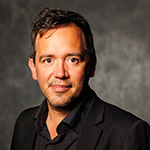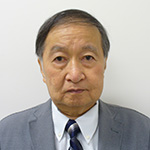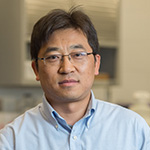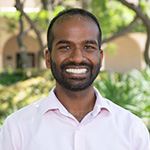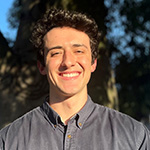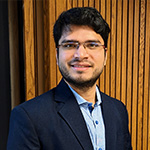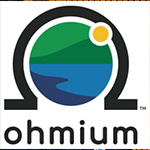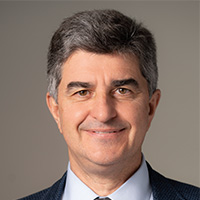Battery Division M. Stanley Whittingham Mid-Career Award
Tuesday, May 20 | 1700h
Palais des Congrès de Montréal, Room 511F
Battery Manufacturing: From Digital Models to the Metaverse
by Alejandro Franco
Alejandro Franco is a Full Professor at the Université de Picardie Jules Verne and Honorary Member of the Institut Universitaire de France. He leads the Theory Open Platform of the ALISTORE European Research Institute and coordinates the Erasmus+ i-MESC International Master Program (Interdisciplinarity in Materials for Energy Storage and Conversion). For more than 20 years, Prof. Franco has conducted research in the field of multiscale modeling of electrochemical energy devices. He received two of the most competitive grants in Europe, an ERC Consolidator Grant for his ARTISTIC project focusing on digitalizing battery manufacturing through multiscale modeling and artificial intelligence (digital twins), and ERC Proof of Concept grant for his innovative SMARTISTIC project aimed at assisting battery manufacturers with Mixed Reality technology. He has participated actively in many European projects and bilateral collaborations with industry.
Prof. Franco completed an MSc in Physics at the Universidad Nacional del Sur, Argentina (2001), PhD at the Université Claude Bernard Lyon 1 (2005), and Habilitation à Diriger des Recherches at the Université de Lyon 1 (2010). He has produced over 158 publications, 12 invited book chapters, three edited books, and 23 patents. Frequently invited to deliver plenary, keynote, and invited oral presentations in international conferences, he has given more than 139 invited lectures and over 67 invited seminars in universities, institutes, and companies. In 2019, he received the French Prize for Pedagogy Innovation for his use of virtual reality in teaching battery science and technology.
Electronics and Photonics Division Award
Tuesday, May 20 | 0800h
Palais des Congrès de Montréal, Room 513C
Atomically Controlled Processing for Group IV Semiconductors by Ultraclean Low-Pressure Chemical Vapor Deposition
by Junichi Murota
Junichi Murota is Professor Emeritus and Research Fellow in the Micro System Integration Center at Tohoku University. Through his 50 years of research, he has made outstanding contributions to atomically controlled processing of group IV semiconductors by low-pressure CVD for ultra large scale integration.
Prof. Murota received his BE (1970), ME (1970), and PhD (1985) in Electronic Engineering from Hokkaido University. From 1972 to 1985, he engaged in research on chemical vapor deposition (CVD) for large scale integration at the Electrical Communication Laboratory, Nippon Telegraph and Telephone Public Corporation. There he demonstrated the self-limited reaction and selective deposition on Si (100) for Mo, W, and Ge. In 1985, he joined Tohoku University where he developed atomically controlled and ultraclean processing by low-pressure CVD. He was named Professor Emeritus at Tohoku University in 2012, and Research Fellow in their Micro System Integration Center in 2015. Prof. Murota has published over 300 articles in refereed journals, conference proceedings, and book chapters, and was co-editor of eight special journal issues.
Honors received by the professor include the 2010 Commendation for Science and Technology from the Japanese Minister of Education, Culture, Sports, Science and Technology, and 2003 Yamazaki-Teiichi Prize. He is a Fellow of The Electrochemical Society and the Japan Society of Applied Physics. Prof. Murota joined ECS in 1987 and is now an Emeritus Member. He has served on the ECS Board of Directors and in all the ECS Electronics and Photonics Division’s officer positions, which he continues to serve as a Member at Large. Prof. Murota is the author of 15 papers in ECS Journals (including three for the Journal of Solid State Science and Technology as first author), and 73 papers in ECS conference proceedings (including 16 as invited first author).
Energy Technology Division Research Award
Monday, May 19 | 1400h
Palais des Congrès de Montréal, Room 511A
Single Metal Site Catalysts for Sustainable and Clean Hydrogen Energy
by Gang Wu
Gang Wu is Professor of Chemical Engineering at Washington University in St. Louis with expertise in electrochemical science and engineering. His current research focuses on advanced electrocatalysis and catalysis for hydrogen and carbon-neutral electrochemical energy technologies, such as polymer electrolyte fuel cells, water electrolysis, CO2 reduction, electrosynthesis, and carbon-free nitrogen electrochemistry. He is also interested in developing clean energy-related heterogeneous catalysis including efficient ammonia synthesis and cracking to overcome the grand challenges of hydrogen storage and transportation.
After completing a PhD at the Harbin Institute of Technology (2004), Prof. Wu completed postdocs at Tsinghua University, University of South Carolina, and Los Alamos National Laboratory (LANL). He became a staff scientist at LANL in 2010. Joining The State University of New York-Buffalo as a tenure track Assistant Professor in 2014, he was promoted to tenured Associate Professor in 2018 and Full Professor in 2020. Prof. Wu moved to Washington University in St. Louis in 2024.
Prof. Wu is the author of more than 340 journal papers with nearly 57,000 citations with an h-index of 130 (Google Scholar). Clarivate Analytics has acknowledged Wu as a Highly Cited Researcher continuously since 2018. He serves as Associate Editor for journals including the Journal of The Electrochemical Society. An active ECS member since 2007, Dr. Wu has served on the Joint Journal Editorial Board, Member at Large of the ECS Energy Technology Division, and on that division’s award subcommittees.
Energy Technology Division Graduate Student Award Sponsored by BioLogic
Wednesday, May 21 | 0800h
Palais des Congrès de Montréal, Room 516D
Intermittency Intensifies Catalyst Transformations and Degradation in Liquid Alkaline Water Electrolysis
by Raul Marquez
Raul Marquez is a fifth-year PhD candidate at the University of Texas at Austin, working under Prof. C. Buddie Mullins. His research bridges fundamental and applied science, focusing on the effects of operational conditions and reaction environments on the performance and stability of transition metal-based electrocatalysts for liquid alkaline water electrolysis. He develops methods and equipment to characterize catalyst transformations and degradation by combining insights from instrumental analysis and electrochemical engineering. His work also emphasizes rigor and promotes benchmarking in the scientific community to accelerate the development and implementation of energy conversion technologies.
Marquez earned his BS in Chemical Engineering (2017) and MS in Chemistry (2020) from the Universidad Autónoma de Chihuahua. His work has been published in ACS Energy Letters, Energy & Environmental Science, and other leading journals in energy, catalysis, sustainability, and materials science. Marquez serves as a Community Board Member of the Royal Society of Chemistry’s Materials Horizons. Outside the lab, he is an instructor and ambassador for Clubes de Ciencia MX, a STEM initiative that offers free educational experiences for Hispanic high school and undergraduate students. He is an ECS Student Member and serves as Secretary of the ECS University of Texas at Austin Student Chapter.
Energy Technology Division Supramaniam Srinivasan Young Investigator Award
Wednesday, May 21 | 0805h
Palais des Congrès de Montréal, Room 510D
Electrification and Decarbonization of Chemical Synthesis
by Karthish Manthiram
Karthish Manthiram is Professor of Chemical Engineering and Chemistry at the California Institute of Technology (Caltech). The Manthiram Lab focuses on electrified molecular systems, including the development of heterogeneous electrocatalysts that convert carbon dioxide, water, and nitrogen into useful molecules, as well as electrifying metabolism in living cells.
Prof. Karthish received his BS in Chemical Engineering from Stanford University (2010) and PhD in Chemical Engineering from University of California, Berkeley (2015). After a one-year postdoc at the CalTech, he joined the Massachusetts Institute of Technology as Assistant Professor in 2017. He moved to Caltech as a Full Professor of Chemistry and Chemical Engineering in 2021 and in 2022 was named a William H. Hurt Scholar. Prof. Karthish’s research has been recognized with the ECS San Francisco Section Daniel Cubicciotti Student Award, Gordon and Betty Moore Inventor Fellowship, Department of Energy Early Career Award, National Science Foundation CAREER Award, Sloan Research Fellowship, 3M Nontenured Faculty Award, American Institute of Chemical Engineers 35 Under 35, and Science – Forbes 30 Under 30. He also received accolades for teaching: the Camille Dreyfus Teacher-Scholar Award, C. Michael Mohr Outstanding Undergraduate Teaching Award, MIT Chemical Engineering Outstanding Graduate Teaching Award, and MIT Teaching with Digital Technology Award.
Industrial Electrochemistry and Electrochemical Engineering Division H. H. H. H. Dow Memorial Student Achievement Award
Tuesday, May 20 | 1400h
Palais des Congrès de Montréal, Room 514A
From Atoms to Agriculture: Engineering Electrocatalytic Reactive Separations for Wastewater Nitrate Refining
by Dean Miller
Dean Miller is a Chemical Engineering PhD student at Stanford University and NASA Space Technology Graduate Research Fellow. He seeks to refine pollutants in wastewater into purified chemicals, producing treated water in the process. To do so, his research in William Tarpeh’s Lab focuses on electrocatalytic reactive separation systems that convert wastewater nitrate into purified ammonia. Miller is specifically interested in powering reactive separations with molecular electrocatalysts because of their atomic precision and synthetic tunability. He researches the structure of molecular electrocatalysts as a function of their electrochemical environments, and how structure dictates function for the electrochemical nitrate reduction reaction. He leverages these molecular insights to develop practical electrochemical reactor systems. Miller’s research spans from electrochemical engineering in the Tarpeh Lab, to in situ characterization at synchrotron facilities and technology implementation on operating vegetable farms.
Miller completed undergraduate chemical engineering studies at the University of Pittsburgh as a member of the James McKone Lab where he investigated electron transfer kinetics for redox flow batteries. In 2025, he will join the Anna Wuttig Research Group at the University of Chicago as a postdoctoral researcher. He hopes to spend his career as an electrochemist and electrochemical engineer, applying his efforts to aqueous systems for sustainable chemical production, clean water access, and environmental protection. Miller is an ECS Student Member.
Industrial Electrochemistry and Electrochemical Engineering Division Student Achievement Award
Monday, May 19 | 1400h
Palais des Congrès de Montréal, Room 511B
Strategies for Sustainable Ethylene, Ethanol, and Acetate Via Electrochemical CO₂Reduction
by Monsuru Dauda
Monsuru Olatunji Dauda is a PhD candidate in Chemical Engineering at Louisiana State University (LSU), conducting research under Professor John C. Flake. His research focuses on sustainable chemical production through the electrochemical conversion of CO₂ into valuable chemicals and fuels. By leveraging advanced analytical tools, electrochemical techniques, and computational methods, his work aims to improve the selectivity, activity, and durability of CO₂ conversion processes, addressing critical challenges in sustainability and contributing to the reduction of atmospheric CO₂ levels.
Dauda completed a BTech in Chemical Engineering at Ladoke Akintola University of Technology (Nigeria) and an MS in Chemical Engineering at LSU. Upon completing his PhD, Dauda plans to advance sustainable technologies and mitigate greenhouse gas emissions. He is committed to fostering partnerships with industry to ensure that his research translates into real-world solutions, contributing to a cleaner and greener future. Dauda is an ECS Student Member.
Industrial Electrochemistry and Electrochemical Engineering Division
Ralph E. White Outstanding Student Award
Monday, May 19 | 0920h
Palais des Congrès de Montréal, Room 514A
Mechanistic Interrogation of Solid-State Electrode Architectures|
by Kaustubh Girish Naik
Kaustugh Girish Naik is a PhD candidate in the Energy and Transport Sciences Laboratory, School of Mechanical Engineering, Purdue University. His PhD research pioneered the development of a comprehensive suite of physics-based modeling frameworks for solid state battery electrodes and interfaces. He revealed critical insights into the complex mechanistic interactions in solid state batteries, focusing on electro-chemo-mechanical phenomena, thermo-electrochemical dynamics, and microstructural stochastics. His work elucidates the stability landscape and key limiting mechanisms for solid-solid interfaces, thereby delineating design guidelines for the development of stable, high-performance solid state batteries.
Naik has BTech and MTech degrees in Mechanical Engineering from the Indian Institute of Technology Kharagpur (IIT). His research appears in journals including Advanced Energy Materials, Energy Storage Materials, Applied Mechanics Reviews, and ACS Applied Materials and Interfaces. He presented at ECS Meetings, the Gordon Research Seminar and Conference on Batteries, Minerals, Metals & Materials Society Conference, and International Mechanical Engineering Congress & Exposition. Naik was awarded Purdue University’s 2023 Bilsland Dissertation Fellowship for his excellence in research, academics, and scientific leadership, and the Purdue Trailblazer in Engineering Fellowship for his outstanding scholarly achievements and potential to become a future faculty member broadening diversity and participation in engineering. He received an ECS Travel Grant to attend the 244th ECS Meeting in Gothenburg, Sweden.
Industrial Electrochemistry and Electrochemical Engineering Division
New Electrochemical Technology (NET) Award
Tuesday, May 20 | 0800h
Palais des Congrès de Montréal, Room 514B
Commercialization of PEM Based Hyper Modular Electrolyzer System
by Chockkalingam Karuppaiah
The Ohmium Team is comprised of Arne Ballantine, Ramesh Thangavel, Muralidhar Venkatraman, Vani Rajagopal, Jason Hixson, and Chockkalingam Karuppaiah (who will present the award talk).
Ohmium designs, manufactures, and deploys modular, scalable proton exchange membrane (PEM) electrolyzers that enable cost-competitive green hydrogen production. The company’s suite of electrochemical products helps customers achieve their sustainable energy goals across various industrial, transportation, and energy projects. Headquartered in the US with manufacturing facilities in India and operations worldwide, Ohmium has a global green hydrogen project pipeline exceeding two gigawatts across three continents. In 2023, Ohmium raised $250 Million in Series C financing, led by TPG Rise Climate.
Chockkalingam (Chock) Karuppaiah is Chief Technology Officer at Ohmium, where he leads the development of advanced electrochemical technologies with world-class reduction of iridium usage. He received his PhD in Electrochemistry and Fuel Cells from Rensselaer Polytechnic Institute. With a career spanning over two decades, he held roles such as Vice President of Fuel Cell Stack Engineering at Bloom Energy, founder of EC Labs, and Research Professor at Case Western Reserve University. Dr. Karuppaiah managed the fundamentals team at Plug Power and conducted research at Los Alamos National Laboratory. He designed, developed, and scaled seven products, including polymer electrolyte fuel cells, flow batteries, and solid oxide fuel cells. Holding 36 published patents and over 12 scientific publications, Dr. Karuppaiah recently founded Vetri Labs to support decarbonization efforts through incubation of climate tech and materials tech startup companies, electrochemical research, and consulting.
An ECS Life Member, in the past Dr. Karuppaiah was on the ECS Transactions Editorial Advisory Board and currently serves as 1st Vice Chair of the ECS San Francisco Section and Secretary/Treasurer of the ECS Industrial Electrochemistry and Electrochemical Engineering Division.
Nanocarbons Division Robert C. Haddon Research Award
Tuesday, May 20 | 0900h
Palais des Congrès de Montréal, Room 518C
MXenes and Their Hybrids with Graphene and Other Materials
by Yury Gogotsi
Yury Gogotsi is Distinguished University Professor and Charles T. and Ruth M. Bach Endowed Chair in the Department of Materials Science and Engineering at Drexel University. He founded and serves as Director of the A. J. Drexel Nanomaterials Institute. With his students and colleagues, Prof. Gogotsi made principal contributions to the development of materials for electrochemical capacitors and other energy storage devices; discovered MXenes and polygonal nanotubes (graphite polyhedral crystals); demonstrated the tuning of structure and porosity of carbide-derived carbons; and developed new processes for the synthesis, surface modification, and purification of nanotubes and nanodiamonds.
Prof. Gogotsi received his MS (1984) and PhD (1986) from the Kyiv Polytechnic Institute, then completed a DSc at the National Academy of Sciences of Ukraine, at which time he was the youngest Chemistry PhD in Ukraine. Prof. Gogotsi pursued extensive postdoctoral training as a Humboldt Fellow at the Hochschule Karlsruhe, JSPS Fellow at the Tokyo Institute of Technology (now the Institute of Science Tokyo), and NATO National Research Council Fellow at the Universitetet i Oslo. He joined the University of Illinois in Chicago as Assistant Professor in 1996 and has been at Drexel since 2000.
Prof. Gogotsi is a Fellow of The Electrochemistry Society, National Academy of Inventors, Royal Society of Chemistry, and European Academy of Sciences. He has over 1,250 publications in materials science with over 213,000 citations and an h-index of 245 (Google Scholar). With Vladimir Lavrenko, he published the book Corrosion of High-Performance Ceramics. Recognized as a Highly Cited Researcher in Materials Science and Chemistry and a Citations Laureate in Physics by Clarivate Analytics (Web of Science), his many academic distinctions include the 2021 Materials Research Society Medal, Elsevier Materials Today Innovation Award, and Royal Society of Chemistry Horizon Prize. Prof. Gogotsi delivered the ECS Lecture at the 245th ECS Meeting Plenary Session.
Physical and Analytical Electrochemistry Division David C. Grahame Award
Sunday, May 18 | 1400h
Palais des Congrès de Montréal, Room 513F
Unlocking Interfacial Water for Efficient Making of Hydrogen Carriers
by Yang Shao-Horn
Yang Shao-Horn is JR East Professor of Engineering and faculty member in the Department of Mechanical Engineering, Department of Materials Science and Engineering, and Research Laboratory of Electronics at the Massachusetts Institute of Technology (MIT). Her research centers on physical/material chemistry to tune kinetics and dynamics in enabling energy storage and making chemicals and fuels.
Prof. Shao-Horn received a BS in Metallurgical and Materials Engineering from Beijing University of Technology (1992) and PhD in the same discipline from Michigan Technological University (1998). Before joining MIT in 2002, she was Staff Scientist at the Eveready Battery Company, where she researched materials for various types of batteries. She later received a National Science Foundation International Research Fellowship to work with Claude Delmas at the Institut de chimie de la matière condensée de Bordeaux.
With over 400 publications, more than 75,000 citations, and an h-index of 131 (Google Scholar), Prof. Shao-Horn is among the top-most-cited female scientists in the world focusing on clean energy solutions. She is a member of the National Academy of Engineering and Fellow of The Electrochemical Society, American Association for the Advancement of Science, National Academy of Inventors, and International Society of Electrochemistry. ECS recognized her with the Charles W. Tobias Young Investigator Award and Norman Hackerman Young Authors Award, and Battery Division’s Technology Student Research Award. Other honors include the Royal Society of Chemistry’s Faraday Medal, Technische Universität München’s Dr. Karl Wamsler Innovation Award and Hans Fischer Senior Fellowship, and Alexander von Humboldt-Stiftung Humbolt Prize in Chemistry. Prof. Shao-Horn has co-founded several startups and serves on the board of directors of multiple companies as well as public and private organizations including the Pioneer Center for Accelerating P2X Materials Discovery, Fritz–Haber–Institut der Max-Planck-Gesellschaft, and Wallenberg Initiative Materials Science for Sustainability.
Prof. Shao-Horn joined the Society in 1995 and is now an Awarded ECS Life Member. She has served as a Member at Large of the ECS Battery Division, on the Individual Membership Committee, and various award subcommittees, including the Fellow Selection Subcommittee.






